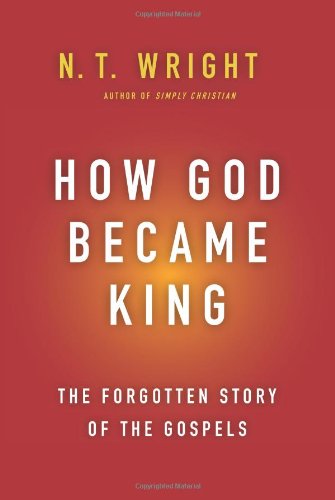Book review: How God Became King
by N. T. Wright
★★★★
Wright begins with the creeds, about Jesus being born of a virgin and dying for our sins, and bemoans the “missing middle.” Christianity today has become too focused on the beginning and end of the Jesus story, and has ignored a primary message of all four Gospels: that God has come back, in the form of Jesus, and reigns today as King.
So who is the Jesus in the middle? A violent revolutionary? A wide-eyed apocalyptic visionary, expecting the end of the world? A mild-mannered teacher of sweet reasonableness? If he was one of the first two, Jesus was deluded. Even if it’s the third case, Jesus was similarly deluded, because most of his followers from that day to this have been anything but sweetly reasonable. Instead, they have busied themselves inventing dogmas (like the virgin birth and the resurrection), writing creeds, and establishing the church.
Thankfully, none of these Jesuses match the Gospels. Wright is sick of scholars and books which portray Jesus as a good Jewish boy who would have been horrified to see a church spring up in his name. He wants us to see Jesus the way the Gospels tell the story, as God coming down to be King of the earth. Wright’s guns are blazing in this book (his passion took me rather by surprise), firing at liberals and feel-gooders. God is no doddering old boss who used to run the company but has since been banished to a cozy upstairs office where he can sit and imagine he’s still in charge. God is king. The story of Jesus is the story of how Israel’s God became king.
Wright’s approach this time is not at all objective. He is a believing Trinitarian, and speaks out against the popular opinion that the high Christology of John is a later development. From the beginning, the Gospel story has been about the divine Jesus, Son of God, God Himself. On Mark’s very first page, the story of Jesus’ baptism, we find “every bit as high a Christology as John’s, though it is a high Jewish Christology.” Wright also discusses Matthew’s viewpoint and Luke’s viewpoint, in each case pointing out the evidence that they considered Jesus divine. Wright never quite nails down his definition of Christ’s divinity … none of this “Jesus is God” direct approach, just as no such claim exists in the scriptures … but we should make the association in some mystical way. For Wright, this verse in Luke says it all:
“Go back to your home,” said Jesus, “and tell them what God has done for you.” And he went off around every town, declaring what Jesus had done for him.
In the end, I am fully behind Wright’s view that the Gospels present Jesus as the fulfillment of God’s return to earth as King, and in my own mystical way I confess to be sort of a Trinitarian, but I simply can’t buy the argument that all of the Gospels contain the same high Christology as John’s Gospel. There are too many opposing arguments that Wright fails to address.












 354 Circles
354 Circles
 603 Goodreads Friends & Fans
603 Goodreads Friends & Fans

 Hello! I'm an author, historical Jesus scholar, book reviewer, and liberal Christian, which means I appreciate and attempt to exercise the humanitarian teachings of Jesus without getting hung up on any particular supernatural or religious beliefs.
The Bible is a magnificent book that has inspired and spiritually fed generations for thousands of years, and each new century seems to bring a deeper understanding of life’s purpose. This is true of not only Christianity; through the years, our age-old religions are slowly transforming from superstitious rituals into humanitarian philosophies. In short, we are growing up, and I am thrilled to be riding the wave.
I avidly read all thought-provoking religion titles. New authors: I'd love to read and review your book!
Hello! I'm an author, historical Jesus scholar, book reviewer, and liberal Christian, which means I appreciate and attempt to exercise the humanitarian teachings of Jesus without getting hung up on any particular supernatural or religious beliefs.
The Bible is a magnificent book that has inspired and spiritually fed generations for thousands of years, and each new century seems to bring a deeper understanding of life’s purpose. This is true of not only Christianity; through the years, our age-old religions are slowly transforming from superstitious rituals into humanitarian philosophies. In short, we are growing up, and I am thrilled to be riding the wave.
I avidly read all thought-provoking religion titles. New authors: I'd love to read and review your book!
 Hi! While Lee writes the articles and reviews the books, I edit, organize, and maintain the blog. The views expressed here are Lee's but I'm his biggest supporter! :-)
Hi! While Lee writes the articles and reviews the books, I edit, organize, and maintain the blog. The views expressed here are Lee's but I'm his biggest supporter! :-)
Well, we’ve got time. Let’s take them one at a time. Name one. Pick a verse. Put it into the big story narrative of God’s dealings with humanity. Suggest how Wright’s telling doesn’t fit. I’ll dig around, try to find how Wright my respond… You know, argue the point and don’t leave it at simple assertions: “There are too many…”
That sounds fun! We’re talking about whether the Synoptics share the high Christology of John, right? I may feel a bit restricted if you require that I choose only verses that fit into the “big story,” as if all Bible writers shared the same vision. So I’ll start with this simple verse to sort of feel out the way you think …
Matthew 19:17, So He said to him, “Why do you call Me good? No one is good but One, that is, God. But if you want to enter into life, keep the commandments.”